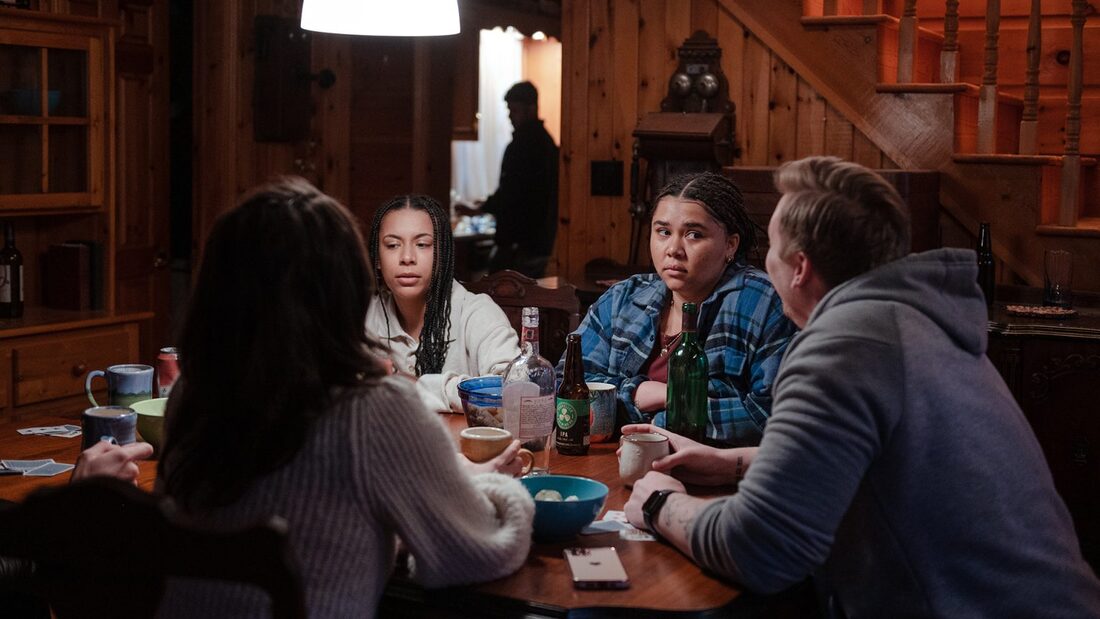|
A still from "Bystanders" (2023) Friendship reunions run the gamut of emotion. Some relationships are able to pick up where they left off as if no time has passed. Others have been shaken by the very common occurrence of simply drifting apart, without rhyme or reason. Approaching a reunion is a cocktail of expectation and uncertainty, as you are getting to know someone all over again, for better or worse. The Canadian film “Bystanders,” written and directed by Koumbie, explores what happens when six childhood friends ruminate on the disturbing past experiences of someone in their circle. The group, who gather for their annual weekend getaway at a remote cottage, are forced to confront the knowledge that one of them is guilty of sexual assault. Each friend takes a stance, ranging from defense and bewilderment, to accountability and punishment. “Bystanders” tackles the aftermath of sexual assault from the perspectives of those who personally know the abuser. Will the circle of friends maintain silence and complicity? Or will the abuser be confronted? Adhering to its title, “Bystanders” is an uncomfortable story of how people navigate confessional wrongdoing and how their decisions reflect society at large.
The story begins with an air of innocence. In watching the group of friends arrive at the getaway home, Koumbie refrains from giving an early indication of the difficult conversations to come. She initially brings a more light hearted tone to the film, engaging in a secret romantic relationship between two characters Ayda (Marlee Sansom) and Zeke (Cavell Holland). The two of them toy with the idea of telling the rest of the group that they are seeing each other. The viewer also sees jovial moments among the friend group overall. Though as the film progresses, the tone becomes more dramatic with the arrival of Justin (Taylor Olson), Adya’s first love and Zeke’s roommate. From the chemistry that Sansom and Olson share, to the energy they bring to their performances, it’s clear that their characters have a history. Ayda appears to have moved on, but Justin is adamant about continuing to pursue her attention. The film establishes from early on that he crosses boundaries and lacks accountability. The tensions between characters, and the way they all observe one another in a shared space, eventually build to a shattering dinner table conversation. It is revealed that Justin is guilty of sexually assaulting his girlfriend when they were university students. When he describes what happened, he fails to grasp the wrongdoing of his behavior. Rather than turn into a character study about the perpetrator, the film branches outward to his surroundings. How each of them reacts to this information is extremely telling of their character. One of the friends, Sophia (Katelyn McCulloch), immediately calls him out and stresses to the group that Justin should be jailed for what he did. Justin’s brother, Kyle (Peter Sarty), carries the frustration that a family member committed something horrible, struggling to fathom that his own brother would do such a thing. The film’s bystanders constantly navigate not only how to approach Justin, but whether their own reactions align with their core beliefs and values. Co-written by Koumbie and Taylor Olson, the film explores literally and figuratively how shared spaces are utilized. Whether sharing a physical space, or an intimate experience. Justin shatters the safe space that held his friend group together; trust is broken upon them finding out someone they thought was a decent human being had committed violence. The film also explores how a man’s actions puts a woman’s experiences into perspective. In light of the news, Ayda begins to reexamine her own relationship history with Justin, and specifically the times she felt that her own safety was violated. It is an unsettling moment in the film that speaks to how women are so often gaslit, and their experiences are not taken seriously. The biggest missed opportunity in “Bystanders” is not centering Ayda’s character throughout. The majority of her scenes tend to revolve around Justin’s presence, rather than elaborate on her point of view. This is a character with conflicting emotions, trying to reconcile the person she once had feelings for with the person he reveals himself to be on the weekend getaway. While there is a strong imbalance of perspective, “Bystanders” makes for a promising feature debut by Koumbie. In exploring the bystanders of the story, she takes an intriguing and introspective approach to heavy subject matter.
0 Comments
Leave a Reply. |
Archives
June 2024
Categories |


 RSS Feed
RSS Feed